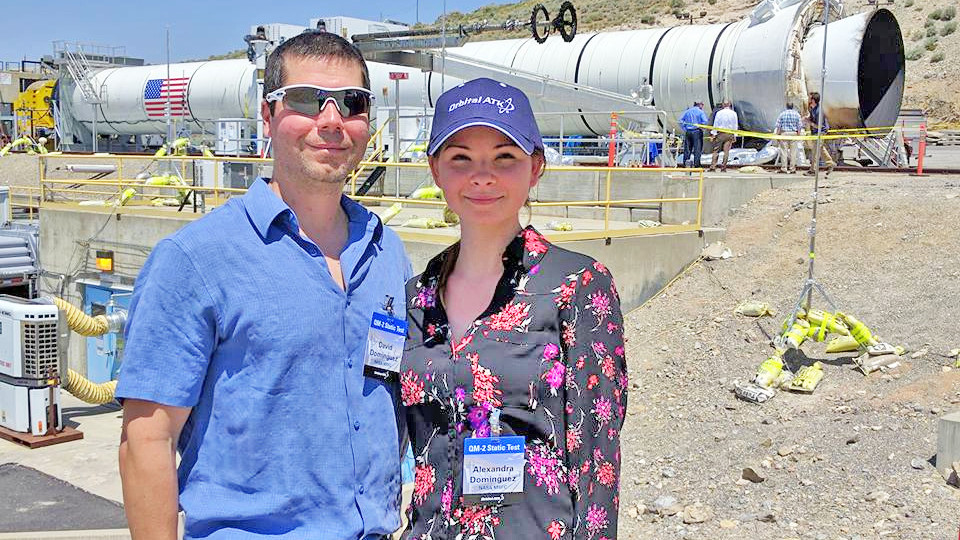
by Troy Fedderson | University Communication
Nebraska Engineering is helping build NASA’s next generation rocket.
Propelled by her education and experiences at the University of Nebraska-Lincoln, alumna Alexandra (Toftul) Dominguez is part of a NASA team developing the Space Launch System. The new spacecraft is replacing the retired space shuttle and will be the most powerful rocket ever built, carrying crew and cargo to the moon, Mars and possibly beyond.
“When I look back at where I was at the start of college, it’s pretty crazy that I’m a control systems analyst for NASA today,” said Dominguez, who works at Marshall Space Flight Center in Huntsville, Alabama.
In October 2009, the electrical engineering and mathematics major attended two campus lectures by Nagin Cox, a Jet Propulsion Laboratory engineer who helped develop the Mars Rover. Nagin is the daughter-in-law of Don Cox, a Nebraska lecturer in electrical and computer engineering.
Nagin’s first talk about working with a team to build, launch, land and operate a rover remotely on another planet ignited a spark within Dominguez. She also attended the second presentation and waited to talk with Nagin afterward.
“I was very interested in astronomy at an early age and wanted to be an astronaut,” Dominguez said. “But, before Nagin's talk, I never actually considered that I could get a job at NASA.
“Her presentations wowed me. I asked what I could do to get involved in the work she was doing and she recommended that I apply for a NASA internship.”
Dominguez followed Cox’s advice, applying for and earning four internship opportunities as an undergraduate.
Three of the internships — one in 2010 and two in 2011 — focused on electrical propulsion research at Marshall. For the fourth, also in 2010, Dominguez worked as a software development intern at Armstrong Flight Research Center at Edwards Air Force Base in Edwards, California.
During the Armstrong internship, Dominguez created a tool to visualize aircraft structural health monitoring data. While at Marshall, she designed, built and tested calibration hardware used to test the performance of a specialized thrust assembly. She also developed an analytical model to predict the behavior of the same assembly.
Dominguez earned a Bachelor of Science degree from Nebraska in 2012. And, her NASA resume continued to grow while she completed master's degree work at Nebraska.
From May 2013 to September 2014, Dominguez completed research through a systems engineering co-op at Marshall. The project included electric propulsion research that served as the basis for her master's thesis.
She graduated with a Master of Science in 2014 and immediately went to work full-time for NASA, first as a flight systems engineer and now as a control systems analyst.
“The whole process of applying for internships and co-ops at NASA really isn’t terribly difficult,” Dominguez said. “NASA likes to have student interns actively working on projects. It’s great experience for the interns and it often leads to other opportunities, even careers, in the future.”
In her current role, Dominguez is part of a team working with Boeing, one of NASA's prime contractors on the Space Launch System project. The group is developing and testing the rocket's Exploration Upper Stage, a second stage that will complete rocket ascent, sending payloads to destinations beyond low-Earth orbit.
“Our group does the modeling and runs simulations in regard to the control systems of the EUS,” Dominguez said. “We consider different maneuvers and scenarios, testing how the EUS will react."
The first Space Launch System mission, Exploration Mission-1, is scheduled for 2019.
Dominguez said the ongoing project and other NASA research efforts offer a variety of opportunities for prospective engineers.
“I would encourage students to get out there and apply for internships with NASA and anywhere else they are interested,” Dominguez said. “Students should get involved in as many opportunities — internships, cooperatives, student groups, clubs and competitions — as possible.
“You never know when an opportunity, even something as simple as attending a lecture, will open a door and lead to something great.”